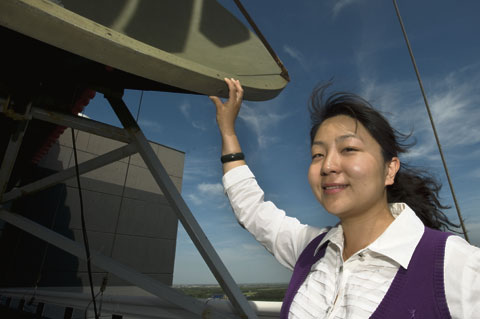It’s called cognitive radio and is defined as an intelligent wireless communication system that is aware of its environment.
You know the radio technologies 3G (3rd generation mobile telecommunications) and 4G? Well cognitive radio will be the next thing.
Worldwide the spectrum is divided in bands which can be used under license by telecom companies, for instance. But with the ever-increasing demands of the electromagnetic radio spectrum, for mobile phones, and also many other appliances, like microwaves for instance, soon there won’t be enough spaces left in the spectrum.
Most of the time however the spectrum is not being used efficiently. Here is an example: when you’re on the phone, you use it only about 30 percent of the time. You say ‘hi’ to someone, and then you wait for the other person to respond by saying ‘hi’. During that moment in between you are not really talking, but rather waiting, and it’s the same thing with spectrum usage. The whole spectrum is not occupied the whole time. Cognitive radio systems can sense the available free space of the spectrum and use it for their own communications.
Of course, besides technical issues, there are a lot of juridical issues to be solved, and business models to be developed. Licensed users will not allow unlicensed users to use their band for free.
To avoid interference with licensed users, cognitive radio systems use direction antennas that direct sharp beams towards their own users, and they then send so-called ‘nulls’ in the direction of the licensed users. A null is an area in an antenna’s radiation pattern where the signal is spatially cancelled out almost entirely.
This transmission part is what my research is mostly about; more specifically, the topic is called ‘beamforming technique for cognitive radio transmission’. I employ array signal processing techniques to solve this problem.
I do have a background in this field: before starting my PhD in Delft, I worked on this topic as a PhD student at the Nanjing University of Aeronautics and Astronautics, which is a military-oriented university.
I felt settled in Nanjing, but decided to leave China and apply for a research job in Europe, because as a child I used to hear broadcasts on the radio about Chinese scientists who went abroad to study and then came back after a while to contribute more to our country again.”
Dat de TU vijftien miljoen euro moet bezuinigen om te komen tot een nulbegroting, okee. Maar daar bovenop nog eens een bedrag van dertig miljoen euro vrijmaken voor nieuw beleid (‘flexibilisering’), dat vindt de ondernemingsraad (or) ‘niet terecht’.
Vullen en uitdelen
Dat bleek vorige week tijdens een overleg tussen de or en het college van bestuur (cvb). “Flexibilisering: dat is zoiets als de zak van Sinterklaas vullen en de inhoud later weer uitdelen,” zei or-lid Erik Louw. “ Het is niet terecht dat het cvb een hele grote pot voor zichzelf gaat vullen en later Sinterklaas gaat spelen. We missen waar het bedrag van dertig miljoen naar toe gaat.”
De voorzitter van het college van bestuur, Dirk Jan van den Berg, noemde het beeld van Sinterklaas ‘heel grappig’, maar zei dat het iets serieuzer was dan een sinterklaasfeest. “Het is geen zak van Sinterklaas. Het bedrag is nodig om te reageren op ontwikkelingen uit de omgeving. Dat kunnen positieve ontwikkelingen zijn of negatieve, bijvoorbeeld een nieuw kabinet dat er stevig inhakt.”
Gok
De or wil het specifieke bedrag van dertig miljoen euro loslaten. Van den Berg zei daarop dat het ‘misschien iets meer of minder kan zijn’. “Afhankelijk van wat je op je pad tegenkomt. Het bedrag is met een zekere gok tot stand gekomen. Het is ongeveer tien procent van de eerste geldstroom (de rijksbijdrage, red.)”
Rector Karel Luyben zei dat de meeste faculteiten denken dat ze een reserve hebben. “Maar die is er niet. Daarvoor moeten ze eerst sparen. De voorganger van Van den Berg (Hans van Luijk, red.) heeft teveel geld uitgedeeld aan faculteiten. Dat leidde niet tot een goede balans. Het bedrag van bij elkaar 45 miljoen is redelijk om over drie jaar te kunnen ademen en een strategie uit te zetten voor beleid.”



Comments are closed.